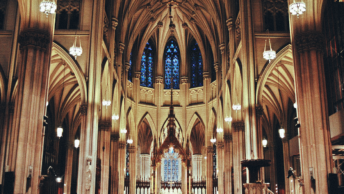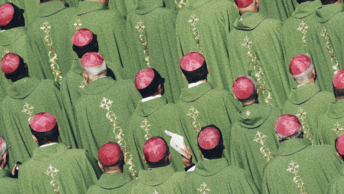The Shepherd metaphor is one of the clearest and most vivid in all of Scripture and not surprisingly was adopted by the Church and used for millennia to describe the relationship of its bishops with its people. The Bible is filled with references to this relationship. Some are warm and encouraging, such as “He shall feed his flock like a shepherd: he shall gather the lambs with his arm, and carry them in his bosom, and shall gently lead those that are with young” (Isa 40:11) and “When Jesus went ashore, He saw a large crowd, and He felt compassion for them because they were like sheep without a shepherd; and He began to teach them many things.” (Mark 6:34)
Others, references, however, are cautionary, including “’As I live,’ declares the Lord God, ‘ . . . My flock has become . . . food for all the animals of the field for lack of a shepherd, and My shepherds did not search for My flock, but rather the shepherds fed themselves and did not feed My flock; therefore, you shepherds, hear the word of the Lord. . . I am against the shepherds, and I will demand My sheep from them and make them stop tending sheep.’” (Ezek 34:8-10) Also, “Be on guard for yourselves and for all the flock that the Holy Spirit has appointed you to as overseers, to shepherd the church of God, which He purchased with His own blood.” (Acts 20:28)
The role of “shepherds” (bishops) is essentially the same today as it was in the early Church—to guide the people in the way of goodness and wisdom and to protect them from the influence of corrupting ideas and movements. The corrupting elements, however, are arguably more numerous and dangerous to individuals and to civilization than ever before. For that reason it is increasingly difficult to understand why todays bishops, rather than opposing dangerous ideas and movements, have often chosen to remain silent about them. Here are some notable examples of such failure.
When riots occurred in a number of cities a few years ago, stores were looted, buildings burned, and people terrorized and often harmed, the mainstream media reported the events as “peaceful protests.” The bishops’ response was meager at best. Instead of condemning what happened as criminal, denouncing the media that reported falsely, and warning Catholics who participated in the riots that they were committing a mortal sin, many bishops spoke only tepidly about social harmony. Worse, some tacitly justified what happened by blaming the riots on “systemic racism” rather than anarchy.
When numerous politicians claimed that police departments are systemically racist and offered legislation to defund or even abolish them, and the media generally supported the legislation, bishops could have strongly argued that such actions were not only a threat to social stability in general but also a serious danger to minorities in crime-ridden neighborhoods. But instead of making such meaningful responses, many bishops lectured us that racism is evil, a fact that was perfectly obvious to almost everyone.
When anarchists persuaded law school professors, district attorneys, and judges that racism rather than criminal behavior caused the high numbers of prison inmates, sentencing guidelines were changed to favor offenders rather than victims, and felons were set free to offend with impunity. If ever there were an opportunity for the “shepherds” to protect their “flocks” from “wolves,” this was it. But instead of opposing the undermining of the criminal justice system, many bishops instead remained silent or delivered another lecture on the evils of racism.
When the theme of “Black Lives Matter” was widely publicized, some who embraced the theme added that “all lives matter.” They were strongly criticized for that addition. The implication was obvious: “No, not all lives matter—only BLACK lives matter.” Some even stated as much, completely missing the fact that the two ideas are not only compatible but also interdependent. “All lives matter” is an all-inclusive idea. Far from denying “black lives matter,” it affirms and strengthens it. That understanding cried out for expression—racial harmony is impossible without it. Here, again, was an opportunity for the bishops to speak out and remind us that all lives indeed matter and the reason is that every human life is created in the image and likeness of God. Doing so would have advanced the cause of social harmony and mutual love. Yet most bishops remained silent or, worse, supported the BLM position.
In recent years, assaults on free speech have increased. Colleges and universities have led the way by tolerating, and in many cases encouraging, the shouting down or disinviting of speakers whose views oppose the preferred narrative. Social media have added their own assault by banning members whose views they disagree with. The result of these combined initiatives has been has been the stifling of public discourse and debate about both timely and timeless issues. One might reasonably have expected the bishops to realize that these assaults on free speech were denying hundreds of millions of people the knowledge essential to using God’s greatest gifts to mankind—intellect and will—and making informed judgments. Given that the Catholic Church has led the world in the cultivation of these gifts, the bishops should have led the way in condemning the assault on free speech. Yet most of them have not.
Critical Race Theory (CRT) is a Marxist philosophy that has long been taught in colleges and universities. It has also become part of federal employment training. For example, “The Treasury Department told its staff that ‘virtually all white people contribute to racism’ and that they must convert ‘everyone in the federal government’ to the ideology of ‘antiracism.’ And the Sandia National Laboratories . . . [sent executives to a] reeducation camp, where they were told that ‘white male culture’ was analogous to the “KKK,’ ‘white supremacists,” and ‘mass killings.’ The executives were then forced to renounce their ‘white male privilege’and write letters of apology to fictitious women and people of color.”
More recently CRT has come to elementary and high schools, including some Catholic schools. Children are taught that virtually every social institution is racist to its core, white children should be guilty for their “power advantage” over black children, and black children should recognize and oppose their “disadvantage.” To say that CRT encourages divisiveness would be an understatement. It not only makes a mockery of Martin Luther King Jr’s “judging by the content of one’s character” but more importantly of Christ’s teaching to “love one another as I have loved you,” All Christians, notably Catholic bishops, should be vigorous and unrelenting in their opposition to CRT. Alas, Catholic bishops, by and large, have been neither.
A movement is well underway to deny parents a say in their children’s education. “Leave it to the professionals” has been the mantra. As a result, parents who seek to be informed about what their children are being taught, let alone oppose it, are dismissed as troublemakers. If they attend school board meetings for redress, they are threatened with arrest. The Catholic Church has always taught that parents not only have the right to be involved in their children’s education but also the primary responsibility for it, and that both the rights and the responsibilities are God-given. Thus, Bishops, as Shepherds, have a duty to safeguard the parents’ role in education. Unfortunately, their attention to that duty has been far from adequate.
An even more outrageous movement in education is the one that teaches second and third grade children about various sexual acts and gender identity. The latter lessons explain that what makes an individual male or female is not biology but “gender identity,” and give the children guidance in finding that identity. In some cases, the instruction is mandatory; that is, that there is no way for parents to opt out of it for their children. In fact, parents may not even be informed that it is taking place. Critics of the movement argue that teaching about sexual acts is inappropriate for young schoolchildren; also, that the unscientific substitution of “gender identity” for biology as the determinant of maleness and femaleness can create gender dysphoria and lead to ill-advised hormonal “therapy” and gender-changing surgery. The bishops have offered little, if any guidance to parents and teachers for responding to this movement, which both science and Catholic teaching oppose.
If the radical border policy of the Biden administration continues, by the end of Biden’s term, fully 20% of U.S. residents will be here illegally. The bishops were not silent at first but became so only after the havoc caused by the policy had increased dramatically. For years, however, the bishops regarded violations of the border as virtuous. Their reasoning was that because the U.S. is rich and many other countries are poor and/or corruptly governed, the U.S. is morally obligated to welcome anyone fleeing danger or seeking a better life. From the standpoint of general ethics or moral theology, that reasoning was fallacious. It focused solely on the central message of the Good Samaritan parable and neglected its qualifying details. The Samaritan gave his own money, not the innkeeper’s nor Caesar’s. That is much more difficult (and meritorious) than being charitable with other people’s money, as the bishops have approved and supported.
In responding to the immigration situation, the bishops have chosen to serve illegal immigrants at the expense of the people in their dioceses. That is as irresponsible as it would have been for shepherds of old to abandon their sheep and take care of someone else’s sheep. (For more on these points, see Pope Leo XIII’s Rerum Novarum, 4- 8, 11, 20, 22)
I can imagine a bishop challenging the last paragraph by noting that they are called to serve the Church Universal as well as the Church Local. My response is this: I am not arguing that you can’t serve both; only that you mustn’t serve one rather than the other. Here’s how both can be served—(1) work with fellow bishops in poor countries to improve the conditions in those countries; (2) work with the U.S. government to improve the legal immigration system; and (3) abandon that unbecoming silent mode and begin speaking forcefully about the harm that illegal immigration has done to this country.
A final note: I titled this essay The Unfathomable Silence of the Shepherds. What exactly do I find unfathomable about that silence? The fact that it suggests the bishops expect the Holy Spirit to correct the world’s problems directly, without their involvement, instead of accepting their obligation to work with the Holy Spirit in providing the moral and spiritual guidance the world so desperately needs.
Copyright © 2022 by Vincent Ryan Ruggiero. All rights reserved








